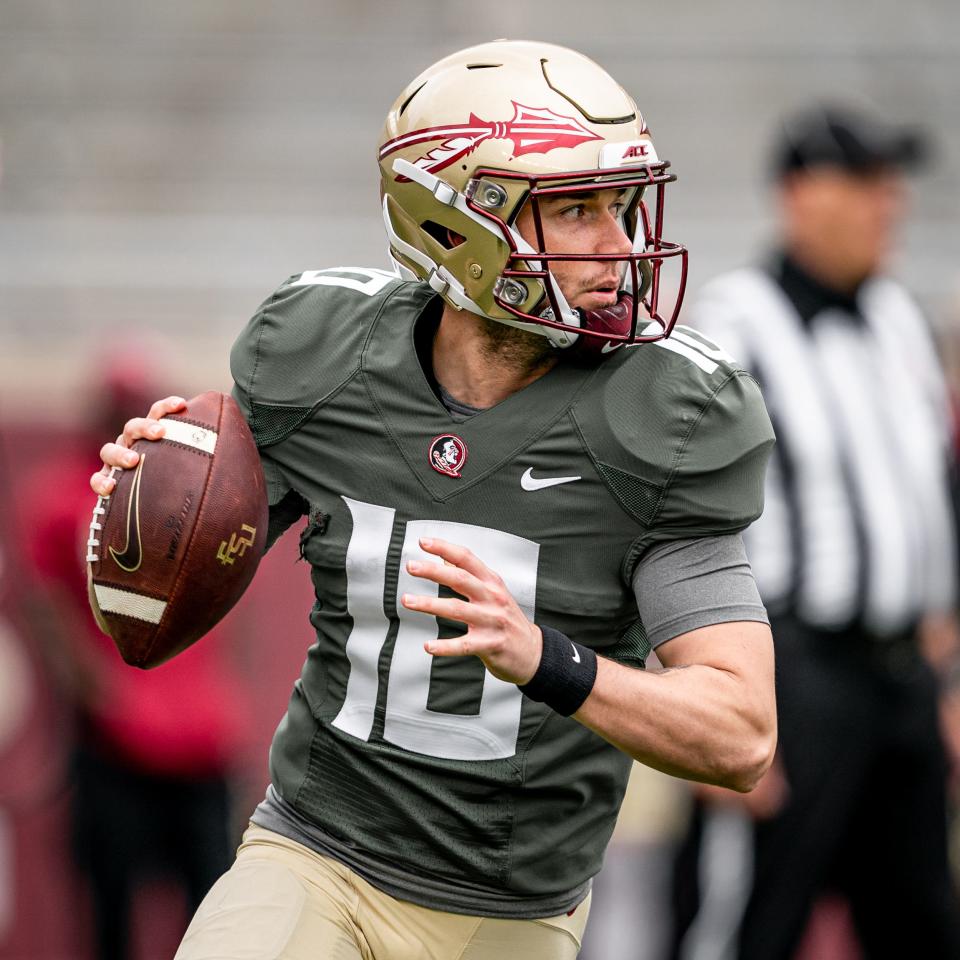Florida State QB outraged at state lawmakers delaying student-athletes being able to profit from NIL
Florida lawmakers have passed a bill that's caught the ire of many student-athletes, including Florida State quarterback McKenzie Milton, as well as head coach Mike Norvell.
Florida was one of the first states to pass a law allowing college athletes to profit off their name, image, and likeness (NIL). And it was the first to make the effective date of its law July 1, 2021.
A bill passed late Wednesday, however, includes a provision that delays that 2020 law's effective date for a full year — from this July 1 to July 1, 2022.
“We did not want our student athletes, if this law went into effect, to start profiting off NIL and potentially lose scholarships from the NCAA,” state Sen. Travis Hutson, the St. Augustine Republican behind the delay language, told Sports Illustrated on Thursday.
“We decided to do a one-year hold," he added. "It was an abundance of caution. We want our kids to profit from the NIL and that’s something we’re passionate about, but not at the chance they could lose the right to play.”
But, if signed by Gov. Ron DeSantis, this would put Florida behind Alabama and Mississippi, whose governors recently have signed college-sports NIL laws that are set to take effect July 1. A bill in Georgia with that effective date is on Gov. Brian Kemp's desk, and a bill in Texas has passed the state senate would take effect Sept. 1.
In addition, legislators in California — the first state to pass an NIL law — are considering whether to move up its effective date by a year to Jan. 1, 2022, the same date a new law in Arkansas would take effect.
Three bills have been introduced in this Congressional session that would preempt the state actions, but, for now, Milton — like many players — wasn't happy about the delay of the bill.
"Are we serious right now???," Milton posted on Twitter. "That little black line in a bill with more than 70 pages to continue to screw all these athletes?? Make it make sense."
Are we serious right now?? That little black line in a bill with more than 70 pages to continue to screw all these athletes?? Make it make sense. #NotNCAAProperty pic.twitter.com/aCDFmpUmzR
— McKenzie Milton (@McKenzieMil10) April 29, 2021
In another Twitter post, Milton wrote, "So when will the time actually come College athletes can truly use their OWN name to help benefit themselves and their loved ones, not just the NCAA & universities?? It’s comical at this point. Let the kids play & let the kids get PAYED."
So when will the time actually come College athletes can truly use their OWN name to help benefit themselves and their loved ones not just the NCAA & universities?? It’s comical at this point. Let the kids play & let the kids get PAYED.
— McKenzie Milton (@McKenzieMil10) April 29, 2021
Norvell opined on Twitter later Thursday, saying "There is no reason to wait to do the right thing."
He added: "The state of Florida was a leader on NIL and, as other states quickly tried to follow our model, college athletes in Florida have been able to position themselves to be ready to benefit starting July 1, 2021. #KeepTheDate"
The NIL delay language was among additions to an education bill in behind-closed-doors, end-of-legislative-session maneuvering.
The other was a highly contentious measure to ban transgender athletes from participating in women’s sports at the high school and college levels. That had been moved as a separate bill and failed, then was tacked on to the bill that passed Wednesday night, originally dealing with charter schools.
Wednesday night's bill next goes to DeSantis, who spearheaded the NIL initiative in Florida. The bind he's in now is: Either he signs a bill that delays one of his signature policies, or he vetoes it, meaning he also vetoes the transgender athlete ban and charter school provisions.
Moreover, as to transgender athletes, the NCAA has warned it might move championships out of locations where they felt student athletes were not treated with “dignity and respect.”

Milton and other seniors in the state of Florida are the ones who will be affected the most by the delay. This means that barring further action, Milton and seniors from schools like FSU, Florida, Miami, UCF, etc., will not be able to make endorsement money in the final year of their college career.
Earlier this month, Apex announced a multitiered program designed to empower student-athletes to capitalize on their name, image, and likeness, launched within Florida State athletes.
The program includes a partnership with INFLCR, designed to prepare Florida State student-athletes for Intercollegiate Athlete Compensation and Rights bill, which would have begun on July 1.
Not everyone associated with Florida State athletes is in favor of the NIL bill. Legendary Florida State football coach Bobby Bowden, 91, is not a fan of athletes making endorsement money.
“I don’t like it because some kids will get privilege out of it,” Bowden said Thursday morning from his Killearn Estates home.
“On a football team, you are trying to knit togetherness. All of a sudden, one of them is making a million dollars, and another one is not making anything that can hurt a team. And if a team doesn’t work together, you won’t be successful.
“If you do deserve it (endorsement money), you will get in later (as a professional).”
Steve Berkowitz, Zac Anderson and John Kennedy and wire services contributed to this report.
Follow Antwan Staley on Twitter @antwanstaley.
This article originally appeared on Tallahassee Democrat: Florida State QB McKenzie Milton not happy with state NIL bill delay

